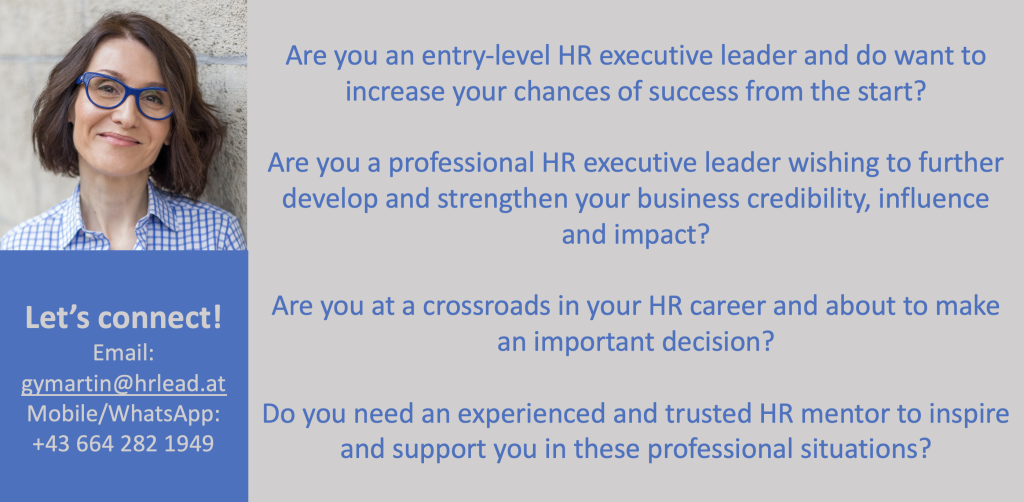How does a strong relationship of trust develop between the company’s number one leader and the HR Director? What does their successful cooperation depend on? What do they expect from each other? How do they support each another?

GABRIELA, HR DIRECTOR
“What’s wrong?” – I asked Gabriela, who was standing in front of me with a reddened face.
“Ah, nothing, but the usual. I’m fed up,” – she said angrily.
“But still, what happened?” – I kept wondering.
“My CEO simply brushed aside my proposal for a new performance appraisal system without first consulting me and involving me in the decision. He said he was disappointed in me because this was not the most burning issue for him or the other business leaders right now.” – she was on the brink of crying. “And I was so close to the solution. But he is not interested in HR. He thinks of me as a person working only for their own pleasure and not doing anything relevant for the business. That’s not true. I have worked so hard to develop a performance appraisal tool to support the work of managers and employees.” – she explained the situation whole-heartedly.
“What do you think your CEO is most concerned about right now? What does he want to find a solution for?” –I asked her patiently.
“He didn’t say that.” – Gabriela answered shortly.
MARK, CEO
“My financial director informs me about the financial situation of the company, makes a proposal to improve the efficient and economical operation of the business. My marketing director gives me a forecast of what our consumers might think, feel and buy, and what our competitors are up to. My sales director reports on the current market situation, presents the latest sales data, shows customer satisfaction indicators and makes suggestions on how we can increase our market share.” – Mark said firmly. “In the meantime, my HR director redesigns the performance appraisal system AGAIN … In our company, HR unlike other business functions does not have a clear and accepted concept of how to create added value for the business,” –summed up Mark his opinion.
“What would be the solution?” – I asked.
“I would like Gabriela to improve her business acumen. If she showed more interest in business, I could consider her as an equal partner. I find it important that she should be able to think with the business leaders and employees not only in HR topics but also beyond that.”
I have been working in the HR profession for many years, so I am aware that most human resource professionals are still struggling to find their way to the top management level.
Therefore, it terribly annoys me that we are still speaking about the same old story. Year after year, senior executives tell us what they expect of us, yet there are very few significant changes in HR practice (with a few honorable exceptions). You know this, as well. But how many times do you want to face this challenge? Do you want to work on it at all?
As the number one leader in the organisation plays a primary role in accepting the HR function and its leader as part of the executive team, allow me to share some constructive thoughts about the following questions: How does a strong relationship of trust develop between a company’s number one leader and the HR director? What is the condition for their successful collaboration? What do they expect from each other and how do they support each other?
The number one leader in an organisation
The Chief Executive Officer or Managing Director (the “CEO”) is responsible for increasing shareholder value, the overall success of the business organisation, developing and implementing long-term business strategies, and making top-level management decisions.
No matter which part of the world the CEOs work in, which company they lead, the present and the future of the business they run is full of complexity and uncertainty. This uncertainty may negatively affect or slow down the business growth expected by the shareholders, which will affect the CEOs’ success when their corporate position is judged. Over the past two years, the percentage of top executives who believe global GDP growth will slow down has increased tenfold (from 5% to 53%). This general pessimism was only exacerbated by the COVID-19 pandemic.
Top executives are preoccupied with topics such as short- and long-term business growth, over-regulation by legislation and regulatory inconsistencies, ever-changing market conditions, commercial risks, technological development, scarcity of employees with key competencies and skills, changing consumer behavior and expectations, customer satisfaction, business sustainability, terrorism and cyber security threats, climate change and environmental damage – to name just a few.
As it follows from the above list, the mission and role of CEOs have changed radically compared to previous decades. With yesterday’s knowledge and methods, they will not be able to solve tomorrow’s challenges and problems. Their current role requires a new approach, a new leadership style, different business solutions and knowledge.
They must ensure the successful market and financial performance of their organisation, they have to navigate their company in the midst of political and legal changes and experiment with new business and organisational models, emerging technologies, and they should have a positive impact on society and communities.
All this in an ever-changing, uncertain environment, and the only thing they can hold onto is the business direction they define (i.e., where should we go?). There is no beaten track to new directions. There are no patterns or best practices for that. Maybe no man has ever been there yet. To answer the questions what, why, how, with whom and when, the CEOs need the courage to recognise and have the insight that they do not know the answers to all the questions. They need the right team with whom development and successful transformation can come true.

The anatomy of the relationship
An effective partnership between the CEO and the HR Director has a positive and lasting effect on the business. Using my experience and the experience collected from other HR directors, as well as the feedback of CEOs, I have compiled some basic elements that are the key to a successful relationship based on trust:
Vision: The CEO and the HR Director have a coordinated organisational and business vision. They anticipate the needs of the organisation, create business opportunities, reduce risks, identify solutions and prepare for change together.
Partnership: They are constantly strengthening their relationship and rely on each other. Ideally, the chemistry between them works well. They share the same values. They develop constructive, two-way communication.
Business acumen: They both have an entrepreneurial approach, know the business and the connections in detail, and dedicate this knowledge to achieve continuous business growth. Business thinking is critical to business decisions and helps to understand how they affect human strategy.
Business language: Confident use of business language is a prerequisite for effective collaboration. It helps their quick understanding, acceptance and decision-making.
Openness: In an open and straightforward relationship, the HR Director can hold a mirror up to the CEO and is not afraid to tell the truth if it is in the best interest of the organisation. He/she gives the CEO objective feedback, supports his/her personal and leadership development. They have a mutual confidentiality obligation.
Saying ‘no’: The HR Director must maintain his/her integrity by setting boundaries. In situations that go beyond this boundary and do not serve the interests of the business, the HR Director may feel free to say ‘no’.
The two sides of a coin
In all relationships, whether formal or private, the parties have certain ideas about how the relationship works. Let’s see what typical expectations a CEO and an HR Director have towards each other.
The CEO’s expectations
- Reasonable, efficient, cost-effective operation and management of basic HR activities and the HR department
- Preparing the organisation for the future: this includes defining the vision of HR, transforming the corporate culture and leadership, planning and implementing organisational transformation, selecting the right people, forming teams that deliver reliably high performance, an approach to competitiveness, adaptability, knowledge and building skills, ensuring the human side of business sustainability
- Developing innovative solutions (this includes HR tech solutions too)
- Supporting the data-based decision-making in business, increasing human capacity
- Thinking and acting as a leader (e.g. anticipating change, prudent risk-taking, proactivity, responsibility for business performance, communicating as a leader, having influence, regular collaboration with other managers / employees / external partners, being a corporate brand ambassador)
The HR Director’s expectations
- Being actively involved in the development of the organisation’s business strategy, not just expecting the HR Director to support the implementation
- Open and honest communication (without hidden agenda), keeping promises
- Timely sharing of important business information and contents, joint preparation of decisions
- Support of key HR initiatives
- Providing specific support (e.g. in professional development, in the provision of financial and other resources)
Maintaining good relations is the responsibility of both parties. Paying attention, showing empathy, exercising emotional control, maintaining trust and mutual respect, continuous communication, and the right method of managing conflict between the parties can help a lot in this.
As an HR Director, I don’t think the relationship can work at all costs, but I don’t believe in giving up or immediate escape, either. The CEO and the HR Director must also work together to identify the causes of their problems and to find a solution that is acceptable to both of them. They need commitment, acceptance, patience and time. If there is still no positive change, then there is no excuse, it’s time to give up the position. Reflecting on what happened, understanding the mistakes made and learning from these mistakes are all important parts of subsequent career building.
With or without you
If the relationship between the CEO and the HR Director is working well, that shouldn’t be a question. They need each other because they are facing a great and unknown journey in terms of the future of the company and the business. Only through shared thinking, collaboration and conscious development can they bring about profound, sustainable change in the organisation while enjoying the trust, commitment, and support of the employees.”


